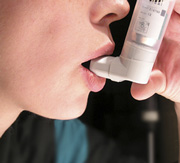< Return to trials
Asthma

Overview
Lillestol Research has performed multiple trials in the asthma indication/diagnosis. The trials have varied in the severity of asthma required for enrollment as well as exacerbation requirements and trial objectives. Our clinic has several trained coordinators in spirometry and our own spirometry equipment.
Spotlight Trial(s)
- This was an asthma trial involving individuals 12 years of age and older with a diagnosis of asthma for more than a year and some exacerbation history. Lillestol Research was able to meet and exceed the sponsor’s enrollment expectation randomizing 11 patients in a 9-month enrollment period.
- This was an asthma trial with a common cold component for individuals 18 years of age and older. Patients screened to the trial and remained in screening for a several month window in order to potentially randomize if/when they experienced common cold symptoms. The trial objective is to lessen the exaggerated common cold symptoms that many asthmatics face due to a compromised respiratory system. Lillestol Research was able to meet and exceed the sponsor’s enrollment expectation by screening 31 patients in a 13-month enrollment period; 6 of our patients experienced the common cold within the randomization window.
Definition
Asthma is a condition in which your airways narrow and swell and produce extra mucus. This can make breathing difficult and trigger coughing, wheezing and shortness of breath.
For some people, asthma is a minor nuisance. For others, it can be a major problem that interferes with daily activities and may lead to a life-threatening asthma attack.
Asthma can't be cured, but its symptoms can be controlled. Because asthma often changes over time, it's important that you work with your doctor to track your signs and symptoms and adjust treatment as needed.
Symptoms
Symptoms of asthma can be mild or severe. You may have mild attacks now and then, or you may have severe symptoms every day, or you may have something in between. How often you have symptoms can also change. When you have asthma, you may:
- Wheeze, making a loud or soft whistling noise that occurs when you breathe in and out.
- Cough a lot.
- Feel tightness in your chest.
- Feel short of breath.
- Have trouble sleeping because of coughing or having a hard time breathing.
- Quickly get tired during exercise.
- Your symptoms may be worse at night.
- Severe asthma attacks can be life-threatening and need emergency treatment.
How is Asthma Diagnosed?
Along with doing a physical exam and asking about your health, your doctor may order lung function tests. These tests include:
- Spirometry. Doctors use this test to diagnose and keep track of asthma. It measures how quickly you can move air in and out of your lungs and how much air you move.
- Peak expiratory flow (PEF). This shows how fast you can breathe out when you try your hardest.
- An exercise or inhalation challenge. This test measures how quickly you can breathe after exercise or after taking a medicine.
- A chest X-ray, to see if another disease is causing your symptoms.
- Allergy tests, if your doctor thinks your symptoms may be caused by allergies.
Sources
http://www.webmd.com/asthma/tc/asthma-in-teens-and-adults-overview
http://www.mayoclinic.com/health/asthma/DS00021
If you have been diagnosed with Asthma or have a history of Asthma symptoms, contact us today to learn more about our current study opportunities for this diagnosis.
Call us at (701) 232-7705 or toll-free at (866) 532-7705.
Signup online or email our recruiter at recruiter(at)lillestolresearch(dot)com.
Your information is always kept confidential.